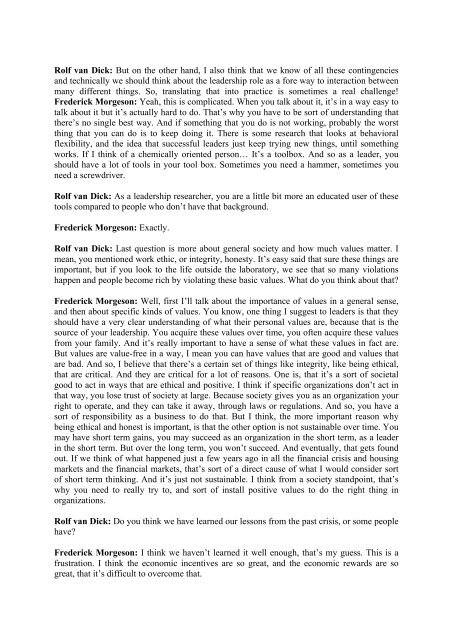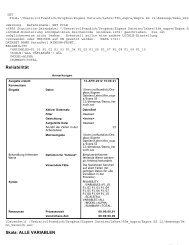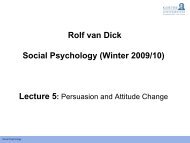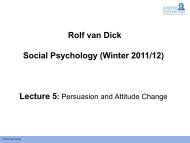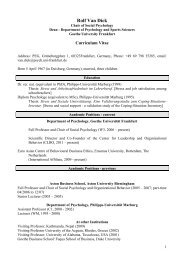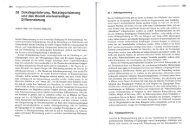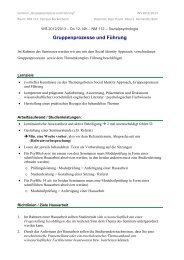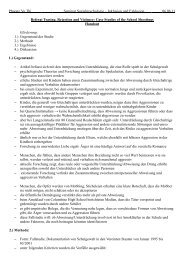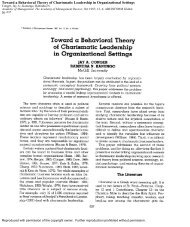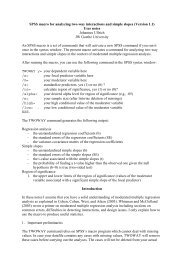Leadership-Interview-Transkript - Sozialpsychologie - Goethe ...
Leadership-Interview-Transkript - Sozialpsychologie - Goethe ...
Leadership-Interview-Transkript - Sozialpsychologie - Goethe ...
Erfolgreiche ePaper selbst erstellen
Machen Sie aus Ihren PDF Publikationen ein blätterbares Flipbook mit unserer einzigartigen Google optimierten e-Paper Software.
Rolf van Dick: But on the other hand, I also think that we know of all these contingencies<br />
and technically we should think about the leadership role as a fore way to interaction between<br />
many different things. So, translating that into practice is sometimes a real challenge!<br />
Frederick Morgeson: Yeah, this is complicated. When you talk about it, it’s in a way easy to<br />
talk about it but it’s actually hard to do. That’s why you have to be sort of understanding that<br />
there’s no single best way. And if something that you do is not working, probably the worst<br />
thing that you can do is to keep doing it. There is some research that looks at behavioral<br />
flexibility, and the idea that successful leaders just keep trying new things, until something<br />
works. If I think of a chemically oriented person… It’s a toolbox. And so as a leader, you<br />
should have a lot of tools in your tool box. Sometimes you need a hammer, sometimes you<br />
need a screwdriver.<br />
Rolf van Dick: As a leadership researcher, you are a little bit more an educated user of these<br />
tools compared to people who don’t have that background.<br />
Frederick Morgeson: Exactly.<br />
Rolf van Dick: Last question is more about general society and how much values matter. I<br />
mean, you mentioned work ethic, or integrity, honesty. It’s easy said that sure these things are<br />
important, but if you look to the life outside the laboratory, we see that so many violations<br />
happen and people become rich by violating these basic values. What do you think about that?<br />
Frederick Morgeson: Well, first I’ll talk about the importance of values in a general sense,<br />
and then about specific kinds of values. You know, one thing I suggest to leaders is that they<br />
should have a very clear understanding of what their personal values are, because that is the<br />
source of your leadership. You acquire these values over time, you often acquire these values<br />
from your family. And it’s really important to have a sense of what these values in fact are.<br />
But values are value-free in a way, I mean you can have values that are good and values that<br />
are bad. And so, I believe that there’s a certain set of things like integrity, like being ethical,<br />
that are critical. And they are critical for a lot of reasons. One is, that it’s a sort of societal<br />
good to act in ways that are ethical and positive. I think if specific organizations don’t act in<br />
that way, you lose trust of society at large. Because society gives you as an organization your<br />
right to operate, and they can take it away, through laws or regulations. And so, you have a<br />
sort of responsibility as a business to do that. But I think, the more important reason why<br />
being ethical and honest is important, is that the other option is not sustainable over time. You<br />
may have short term gains, you may succeed as an organization in the short term, as a leader<br />
in the short term. But over the long term, you won’t succeed. And eventually, that gets found<br />
out. If we think of what happened just a few years ago in all the financial crisis and housing<br />
markets and the financial markets, that’s sort of a direct cause of what I would consider sort<br />
of short term thinking. And it’s just not sustainable. I think from a society standpoint, that’s<br />
why you need to really try to, and sort of install positive values to do the right thing in<br />
organizations.<br />
Rolf van Dick: Do you think we have learned our lessons from the past crisis, or some people<br />
have?<br />
Frederick Morgeson: I think we haven’t learned it well enough, that’s my guess. This is a<br />
frustration. I think the economic incentives are so great, and the economic rewards are so<br />
great, that it’s difficult to overcome that.


